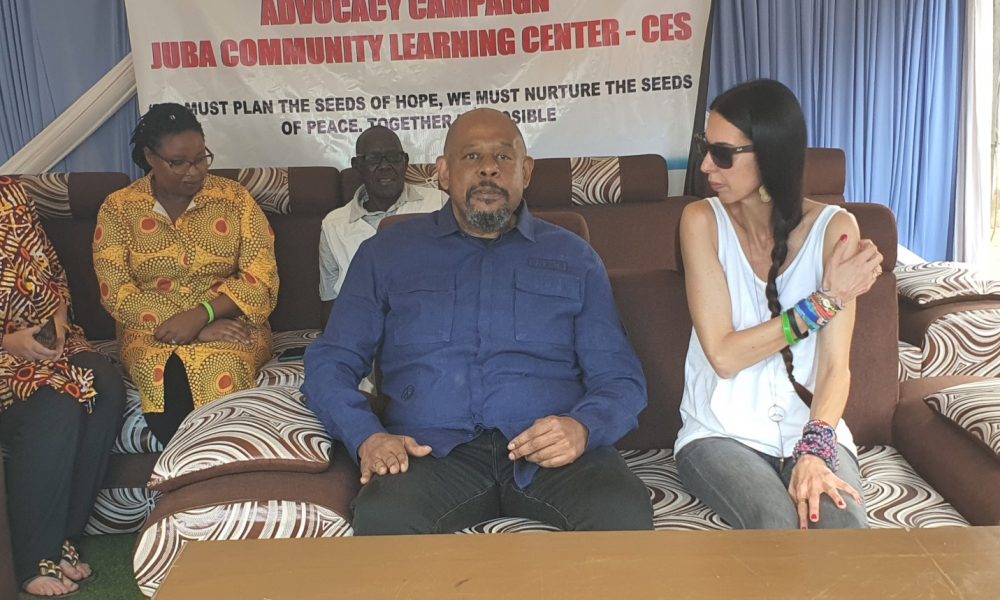By Ephraim Modi Duku Sokiri
Forest Steven Whitaker, an activist and the Chief Executive Officer (CEO) of Whitaker Peace and Development Initiative (WPDI), urges the youth to devote their time to productive activities and desist from conflict.
The American Hollywood film actor, who portrayed a key role as Idi Amin in the famous movie “The Last King of Scotland,” is in the country to assess the progress of WPDI peace initiatives.
Whitaker revealed that the purpose of his visit is to scrutinize his accomplishments and continue supporting the activities of bringing peace to the Republic of South Sudan.
“I started this organization almost eleven years ago, and I was coming around now that we are larger, and what I did was, come to inspect what is going on, how the work is going, what the needs are, and to support the people who committed to this program,” he said.
Whitaker said he is trying to encourage the people who work in the program to bring peace to the country.
He added that many of the beneficiaries of the program have testified to him, and he is willing to provide them with any further support.
“They have brought a lot of testimonials, not just today but from before, and you can see that people are pleased and want more of what we are doing,” said Whitaker.
The Hollywood star and UN peace ambassador urged the youths of South Sudan to devote themselves to engaging in productive ways to realize their future for the country.
“Youths need to commit themselves and be willing to try; we will stand by their side to try to help them move forward on whatever agenda they have for their lives into their livelihood,” he encouraged.
Whitaker acknowledged the occurrence of the political and inter-communal confrontations that he was trying to curb by uniting the youths to serve a common ground and be able to lift themselves and others to attain sustainable peace in the country.
“I think there are a series of conflicts that grew up in the country, of different types; some are just between tribes, and I would like to try to bring the youths together because the youths are the future of this country, and I think it needs their work to try to help each other to move people away from those things that the people are talking about outside there,” said Whitaker.
Bush Buse, the Program Coordinator of the Whitaker Peace and Development Initiative (WPDI), underscored that there are a large number of communities in Central Equatoria State (CES) that have been involved in discussing peace in some mutual modus.
“In South Sudan and especially in Central Equatoria State, we were able to conduct over forty community dialogues between 2019 and 2023,” he cited.
“These dialogues, which were organized in CES, were meant to provide space for community members to resolve their own issues.” So WPDI provides and facilitates this dialogue through its trained IOTs.”
Buse also underscored that they have people who are working at the Payam level in training some of the youth and young people in over forty schools, including some leaders on conflict resolution.
“We also have Trainers of Trainees (TOTs) who work with youths called the Payam Youth because we operate in all of the payams of the targeted counties,” said Buse.
“They also engaged in training young people in schools; in CES alone, we have 49 schools, both primary and secondary, for young people where we teach peace and how to be able to resolve issues that will arise among themselves in the schools and families.”
Buse noted that they also train leaders in the payams and community centers.
“In the LCL that has been established in Juba, we train about 250 young people every three months in areas of ICT, arts and crafts, conflict resolution and education (CR&E), business and entrepreneurship, and filmmaking.””
However, a representative of trainees for the CR&E, Hakim Anthony, stated how he benefited from the training he has attained as a result of the programs at Whitaker.
“We benefited a lot; personally, the benefit started with me as a conflict resolution, and it has changed a lot in my mind, as has the horrible hostile person in the community, as South Sudanese are known to be hostile,” he said.
Hakim added that he has created relationships with other tribes, which was not the story about him before the training.
“After this training, I began to build up relationships with other tribemates. As you know, South Sudan is a tribal country, and some of us are being misunderstood as tribal people. But we are able to socialize at this center,” said Hakim.




